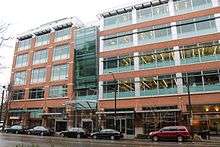Center for Infectious Disease Research
| Non-profit organization | |
| Industry | Biomedical research, Global health, Infectious disease |
| Founded | 1976 |
| Headquarters | Seattle, Washington |
Key people | Ken Stuart, President/Founder |
Number of employees | 250+ |
| Website | http://www.seattlebiomed.org/ |
Center for Infectious Disease Research, formerly known as Seattle BioMed, Seattle Biomedical Research Institute or SBRI, is the largest independent, non-profit organization in the United States focused solely on infectious disease discovery research. The mission of Seattle BioMed's 250+ employees is to eliminate the world's most devastating infectious diseases through leadership in scientific discovery. Seattle BioMed is headquartered and has research labs in the South Lake Union area of Seattle, WA. Seattle BioMed's research focuses on four areas of infectious disease: HIV/AIDS, malaria, tuberculosis (TB), and Emerging & Neglected Diseases (END) like African sleeping sickness, leishmaniasis, Chagas disease, and toxoplasmosis. Seattle BioMed is engaged in early stages of the scientific pipeline including bench science and malaria clinical trials and has expertise in immunology, vaccinology, and drug discovery.
History

In 1976, founders Ruth W. Shearer, Ph.D., and Kenneth Stuart, Ph.D., set up a research laboratory in Issaquah, WA. Originally called the Issaquah Group for Health and Environmental Research, the name was soon changed to Issaquah Biomedical Research Institute. Scientists at the Institute studied parasites including ones that cause malaria and African sleeping sickness. In 1986, the Institute relocated to Seattle, Washington to enhance its scientific programs and became Seattle Biomedical Research Institute.[1]
In January 2012, Alan Aderem, Ph.D. became president of Seattle BioMed, only the second in its 36-year history, with Dr. Stuart remaining in an active role as President Emeritus and Founder. As part of the Institute's plan for scientific expansion, Dr. Aderem is leading the implementation of integrating systems biology approaches to understanding infectious disease.[2]
Current Research
Seattle BioMed performs research on four areas of infectious disease:HIV/AIDS, malaria, tuberculosis (TB), and Emerging & Neglected Diseases (END) like African sleeping sickness, leishmaniasis, Chagas disease, and toxoplasmosis. Seattle is a hub for global health research, and in July 2012, Seattle Magazine honored two Seattle BioMed leaders (Dr. Stuart and Theresa Britschgi, Director of BioQuest) as "Top Docs" for the work they're doing in research and scientific training.[3]
As part of a broad global initiative to fight malaria, Seattle BioMed developed its malaria program in 2000, with an initial grant from the Bill & Melinda Gates Foundation. With a three-pronged approach, Seattle BioMed's malaria program is focused on vaccine discovery for pregnancy malaria, severe malaria in children, and liver-stage malaria. In 2005, Seattle BioMed received two Grand Challenges in Global Health grants to accelerate its malaria research.[4] And in 2011, Seattle BioMed was granted another $9 million from the Foundation to support malaria vaccine efforts.[5]
In 2010, Dr. Stefan Kappe developed his own malaria vaccine candidate which is a weakened form of the malaria parasite, and that vaccine candidate is undergoing clinical trials at Walter Reed near Washington, D.C.[6] Soon after, in collaboration with PATH's Malaria Vaccine Initiative, Seattle BioMed became home to one of four malaria clinical trial centers in the world where treatments and vaccines can be safely tested in humans using the human challenge model.[7]
Education & Training
One education program offered by Seattle BioMed to engage and mobilize the next generation of scientists is BioQuest Academy, a "biomedical boot camp" for 11th graders with over 60 hours (two weeks) of intensive instruction through a global health curriculum.[8] BioQuest Academy is a STEM pipeline, and sometimes even "hooks" students into science by accident.[9] In fact, according to PLOS ONE's 2010 journal article, "97% of alumni (2005-2008) are attending postsecondary schools throughout North America; eight graduates have already published scientific articles in peer-reviewed journals and/or presented their scientific data at national and international meetings, and 26 have been retained by Seattle BioMed researchers as compensated technicians and interns."[10]
References
- ↑ http://humanosphere.kplu.org/2011/06/working-class-kid-builds-a-world-class-research-institute-in-seattle-after-starting-in-a-strip-mall/
- ↑ http://www.genomeweb.com/alan-aderem-joins-ken-stuarts-seattle-biomedical-research-institute/
- ↑ http://seattlemag.com/gallery/top-doctors-2012-global-health-awards/
- ↑ http://www.grandchallenges.org/Pages/GCGHGrantsAwarded.aspx?TDate=Grand%20Challenges%20Grants%20%E2%80%93%20May%202005/
- ↑ http://www.xconomy.com/seattle/2011/04/27/seattle-biomed-nabs-9m-gates-foundation-grant-to-develop-malaria-vaccines/
- ↑ http://www.nature.com/nature/journal/v484/n7395_supp/full/484S24a.html/
- ↑ http://www.xconomy.com/seattle/2010/03/26/nine-years-in-the-making-seattle-biomeds-malaria-vaccine-on-verge-of-first-human-trial/
- ↑ http://www.nsta.org/publications/news/story.aspx?id=58034&print=true/
- ↑ http://humanosphere.org/2012/04/hooked-on-science-by-accident-kimberly-choi-puts-it-to-work-in-the-global-community/
- ↑ http://www.plosone.org/article/info%3Adoi%2F10.1371%2Fjournal.pone.0013814/
External links
Coordinates: 47°37′16″N 122°20′20″W / 47.62111°N 122.33889°W